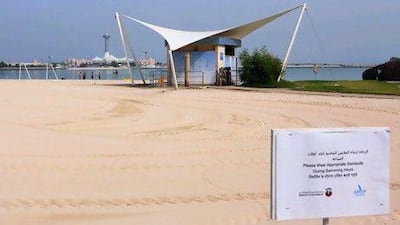ABU DHABI // Unaccompanied men are banned from sitting in areas of the Corniche because women and families complained to the municipality that their privacy was being disturbed, authorities say.
Single men – any not with a woman or a child – are allowed in the area’s two free beaches and at the paid Al Sahil beach, as long as they wear proper swimming attire.
They are also welcome in the gardens and footpaths near those beaches, said Arif Al Tamimi, a supervisor in the municipality’s community-services division.
“Single men are allowed to sit and enjoy,” Mr Al Tamimi said. “They can have a good time.”
But he said they were barred from the paid Family Beach and not allowed to sit along the footpath behind it. “They can walk but they cannot sit.”
Abu Dhabi Municipality introduced the rules after those using the beach complained that men stared at, photographed or bothered them, municipal officials said.
“I don’t feel comfortable going to the Abu Dhabi Corniche,” said Ayesha Mohamed, 21, a Zayed University student. “There are many teenage boys mocking and provoking everyone, including girls.”
Gaps in the tall hedge planted around the Family Beach for privacy allow passers-by to peer in, Mr Al Tamimi said.
Even in places where unaccompanied men are allowed to sit, guards can ask them to leave if someone complains, he said.
“If anybody complains, if there is something uncomfortable, we have to take action,” Mr Al Tamimi said.
Research by the Zayed University anthropologist Jane Bristol-Rhys found that many labourers feel unwelcome in parts of Abu Dhabi, including the Corniche.
At the Corniche last month, a Pakistani construction worker, Farhan Ahmad, expressed his frustration at having a security guard blow his whistle and ask him to leave.
“They just allow the family person,” said Mr Ahmad, 26. “You know that inside the UAE most people are without families.”
The rules apply to all unaccompanied men, Mr Al Tamimi said, be they south Asian labourers, Arab teenagers or western businessmen.
“We do not discriminate,” he said. “Everybody is most welcome if he follows our rules and regulations.”
View Abu Dhabi Corniche beach guide in a larger map
Nahla Al Mehairi, head of the municipality’s events and beaches sections, said: “At the end of the day it’s a public place, for everyone.”
When he was told to leave, Mr Ahmad was on a bench near Gate 3, an entrance to the Family Beach.
That area is problematic because a gap in the hedge allows a view of the beach, Mr Al Tamimi said. There is also a playground nearby.
“We have a lot of complaints from the families,” he said. “They don’t like people to sit and watch their children. It’s uncomfortable.”
People using the beach said they were aware of the restrictions.
Odai Al Bostanje, 17, from Jordan, said the rules were about Islam and community values.
Noor Halton, 17, from Ireland, said: “It has its advantages and disadvantages. Sometimes you come with your guy friends and they can’t let us in.”
As for benefits, she said: “We can go, just girls, and no one will bother you.”
Mr Al Tamimi said it was hard to please everyone. “We have to be balanced with everything that we are doing,” he said. “We want everybody to enjoy but in the right way.”
The municipality updated signs on the Corniche last month, adding pictures of forbidden activities. Rules are also available on brochures at the beach gates.
Security should explain the rules to all infringers, although some men pretend not to understand or keep coming back, Mr Al Tamimi said.
“We are not perfect,” he said. “We make mistakes. But if somebody sees something not good, talk to us.”
* With additional reporting by Ayesha Almazroui

